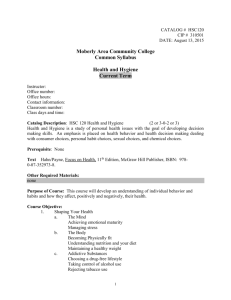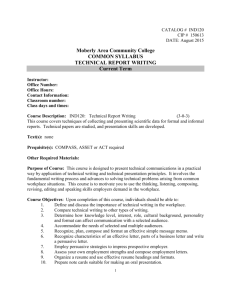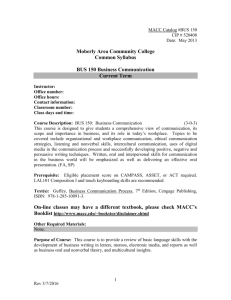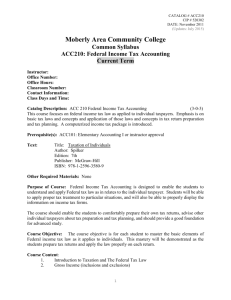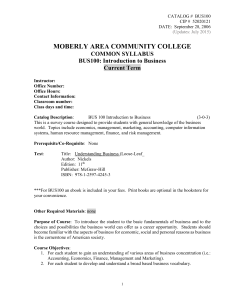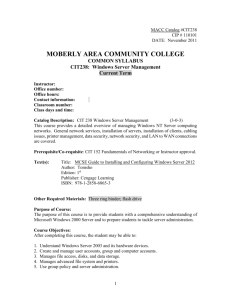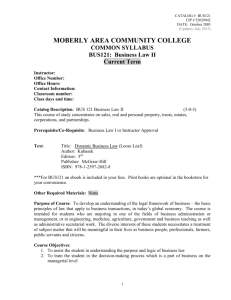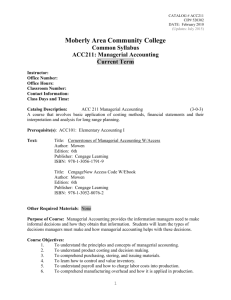MKT 105 Principles of Marketing - Moberly Area Community College
advertisement
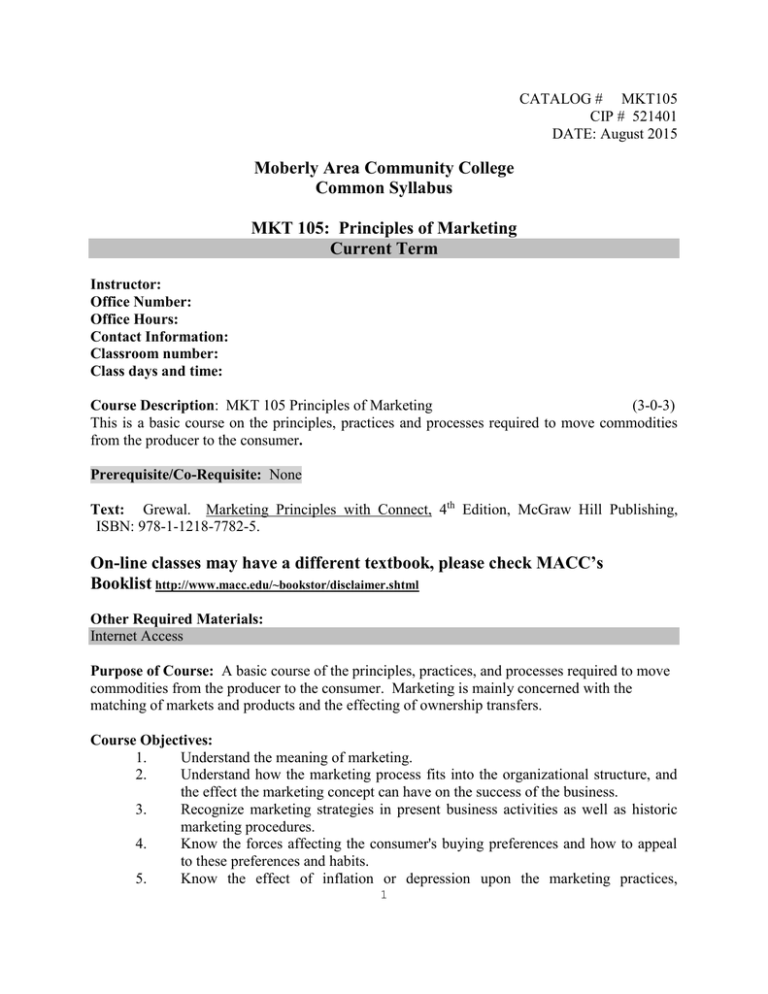
CATALOG # MKT105 CIP # 521401 DATE: August 2015 Moberly Area Community College Common Syllabus MKT 105: Principles of Marketing Current Term Instructor: Office Number: Office Hours: Contact Information: Classroom number: Class days and time: Course Description: MKT 105 Principles of Marketing (3-0-3) This is a basic course on the principles, practices and processes required to move commodities from the producer to the consumer. Prerequisite/Co-Requisite: None Text: Grewal. Marketing Principles with Connect, 4th Edition, McGraw Hill Publishing, ISBN: 978-1-1218-7782-5. On-line classes may have a different textbook, please check MACC’s Booklist http://www.macc.edu/~bookstor/disclaimer.shtml Other Required Materials: Internet Access Purpose of Course: A basic course of the principles, practices, and processes required to move commodities from the producer to the consumer. Marketing is mainly concerned with the matching of markets and products and the effecting of ownership transfers. Course Objectives: 1. Understand the meaning of marketing. 2. Understand how the marketing process fits into the organizational structure, and the effect the marketing concept can have on the success of the business. 3. Recognize marketing strategies in present business activities as well as historic marketing procedures. 4. Know the forces affecting the consumer's buying preferences and how to appeal to these preferences and habits. 5. Know the effect of inflation or depression upon the marketing practices, 1 6. 7. particularly in regard to pricing and inventory. Understand how to guide a marketing research project from start to finish. Know how laws have affected marketing procedures. Course Content: The Importance and Scope of Marketing Marketing Management and Planning Environments for Marketing Strategies Marketing Segmentation and Sales Forecasting Information for Marketing Decisions Consumer Buying Behavior Organizational Buying Behavior Product and Service Concept Product Development and Strategy Pricing Concepts and Practices Channels and Wholesaling Distributing Goods Marketing Communication--The Promotional Mix International Marketing Nonprofit Marketing Assessment of Student Learning: Grading: Exams @ 100 pts each 300 Points Description - There will be three exams given throughout the session. Each exam will cover a portion of the course material and will be taken in-class. Method of Evaluation - Exams may consist of True/False, Multiple Choice, Short Answer, and Essay. Each exam will be worth 100 points each. Students not there on exam day may be subject to a different test or a 5% reduction in grade for each day after the exam date. Comprehensive Final Exam 200 Points Description - There will be one comprehensive final exam that will cover a all of the course material and will be taken in-class. Method of Evaluation - Test may consist of True/False, Multiple Choice, Short Answer, and Essay. Students not there on test day may be subject to a different test or a 5% reduction in grade for each day after the test date. Marketing Plan 200 Points Description - Each student must conduct a marketing plan of a business. The plan should include an executive summary, the mission statement, and a competitive analysis along 2 with the key components of the marketing plan. A handout detailing the specific points to cover in the audit will be passed out in the first class meeting. Method of Evaluation - Papers will be evaluated on format, grammar and mechanics, writing style and how thoroughly the student covers the specific points as laid out in the handout that students will receive. Marketing Audit Presentation 100 Points Description - Each student will present his or her marketing plan in a 10-minute briefing to the class. All students must be prepared to present in the last week of class. Students are required to use PowerPoint. (PowerPoint is the mostly widely used presentation software in the business arena.) A computer and a data projector will be available. Treat the presentation as if you were an outside consultant presenting a marketing audit to the principle officers and board of directors of the company that hired you. Students will turn in full size printouts of the slides on the day of the presentation. Use NO binders, folders or notebooks. Simply staple or clip in the upper left corner. Method of Evaluation - Students will be graded on format, eye contact with audience, staying on topic, time, and visual aids (construction and use of). (Note: All work must be completed to receive a grade in this class. Points and assignments are tentative and subject to change.) Grades will be issued according to the following scale: A = 90% - 100% B = 80% - 89% C = 70% - 79% D = 60% - 69% F = 59% - & below 10 unexcused absences 15 unexcused absences 20 unexcused absences -1 letter grade from your ending grade -2 letter grades from your ending grade -3 letter grades from your ending grade Statement to Connect Course with Technical Program Outcome Statement: In compliance with MACC’s General Education outcomes, the student who successfully completes this course will be able to: I. Demonstrate effective written and oral communication; Marketing/Management Program Assessment: The Marketing/Management faculty continually strive to meet the needs of their students through program improvements. These improvements are a result of program assessments and the consultation and advisement of the Marketing Advisory Committee. In addition to the course assessments outlines in this syllabus, the objectives achieved in this course will also be an integral part of the Marketing/Management program assessment. 3 Instructor Policies Academic Dishonesty: MACC board policy is as follows: “Academic dishonesty by students damages institutional credibility and unfairly jeopardizes honest students; therefore, it will not be tolerated in any form.” Forms of academic dishonesty include but are not limited to the following: violations of copyright law, plagiarism, fabrication, cheating, collusion, and other academic misconduct. Incidents of dishonesty regarding assignments, examinations, classroom/laboratory activities, and/or the submission of misleading or false information to the College will be treated seriously. The procedure for handling academic dishonesty is outlined in the Student Handbook (Policy Handbook M.010). In cases of alleged academic dishonesty, the burden of proof is on the student, not on the instructor. Attendance: Any student who misses two consecutive weeks of class during a regular sixteen-week semester or the equivalent proportion of class time during a shorter session will be dropped from the class by the instructor unless acceptable justification is supplied. Additionally, any student who misses more than one-fourth of the entire number of in-seat class meetings in a regular 16-week semester or the equivalent proportion of class time during a shorter session, may be dropped from that class by the instructor if, in the opinion of the instructor, the student does not have reasonable opportunity to succeed in the class. A student’s attendance rate will be calculated based upon the first day of the semester (not the student’s date of enrollment in the course). Student attendance must be defined in a different manner for online, hybrid, and virtual courses. Student attendance in these courses is defined as active participation in the course. Online, hybrid, and virtual courses will, at a minimum, have weekly mechanisms for student participation, such as any or all of the following methods: a. Completion of quizzes or exams b. Submission of assignments c. Participation in threaded discussions d. Communication with the instructor A student who does not participate in an online, hybrid, or virtual course for two consecutive weeks will be dropped by the instructor unless acceptable justification is supplied. As with ground courses, a student’s attendance rate in online courses will also be calculated based upon the first day of the semester. If a student does not demonstrate active participation in the online course within the first two weeks (or the equivalent proportion of class time during a short session), the student will be dropped as “never attended.” Simply logging into an online class does not constitute active participation. Students should be aware that their dropping a course and their last date of attendance in the course may impact their financial aid. Tardiness: 4 Students are expected to be on time for all classes. Attendance will be reported as an unexcused absence for each time a student is over 10 minutes late for a class. Lateness on a regular basis will not be tolerated. Make up and late work: Students are expected to attend all classes for which they are enrolled. Students are directly responsible to instructors for class attendance and work missed during an absence for any cause. If absences jeopardize progress in a course, an instructor may withdraw a student from the course with a grade of "F" or "W" at the discretion of the instructor. When a student is absent, the student is responsible for obtaining missed lecture notes and handouts from other students. Make-up examinations may be authorized for students who miss regularly scheduled examinations due to circumstances beyond their control. Make-up examinations must be administered as soon as possible after the regularly scheduled examination period and must be administered in a controlled environment. Extra-Credit: Extra-Credit may be offered as needed at the discretion of the instructor. Schedule of Student Assignment and Activities: Week 1 Week 2 Week 3 Week 4 Week 5 Week 6 Week 7 Week 8 Week 9 Week10 Week 11 Week 12 Week 13 Week 14 Week 15 Week 16 Chapters 1 & 2 Chapter 3 & 4 Chapter 5 & 6 Chapter 7 Review and Exam 1 Chapter 8 & 9 Chapter 10 & 11 Chapter 12 Review and Exam 2 Chapter 13 & 14 Chapter 15 & 16 Chapter 17 Review and Exam 3 Chapter 18 & 19 Individual Oral Presentations Review and Prepare for Comprehensive Final Exam ADA Statement Students who have disabilities that qualify under the Americans with Disabilities Act may register for assistance through the Office of Access and ADA Services. Students are invited to contact the Access Office to confidentially discuss disability information, academic accommodations, appropriate documentation and procedures. For more information, please call either the Moberly office at (660) 263-4100 x 11240 or the Columbia office at (573) 234-1067 x 12120, or 5 visit our web page at http://www.macc.edu/index.php/services/access-office. Title IX Statement MACC maintains a strict policy prohibiting sexual misconduct in any form, including sexual harassment, sexual discrimination, and sexual violence. All MACC employees, including faculty members, are considered mandated reporters of sexual misconduct and as such are expected to contact the Title IX Coordinator when they become aware, in conversation or in writing, of an incident of sexual misconduct. For more information on this policy or to learn about support resources, please see http://www.macc.edu/sexual-misconduct-policy or contact Dr. Jackie Fischer, MACC’s Title IX Coordinator, at 660-263-4110, ext. 11236 or jackief@macc.edu. 6

